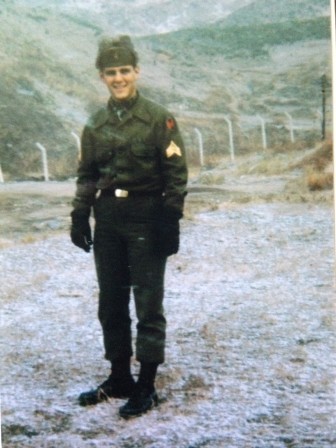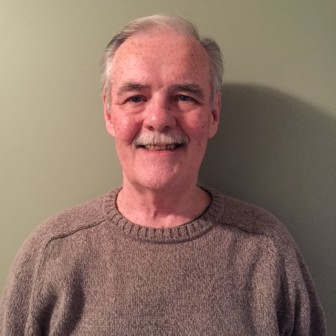A Connecticut veteran who has spent years trying to gain Agent Orange benefits for veterans who served in Korea in 1967 has persuaded the Veterans of Foreign Wars and two other veterans’ organizations to take his case before Congress.
On Wednesday, VFW National Commander John A. Biedrzycki Jr. will ask Congress to pass a law requiring the U.S. Department of Veterans Affairs (VA) to grant VA health care and compensation to veterans who served in Korea in 1967 if they have illnesses linked to Agent Orange.
Biedrzycki’s prepared testimony states that current VA rules exclude many veterans “who now suffer from diseases and illnesses that have been directly linked to the chemical defoliant.”

Photo Courtesy of Eugene Clarke.
Eugene Clarke at Camp Casey, Korea.
Carlos Fuentes, VFW senior legislative associate, said documents provided by Army veteran Eugene Clarke of Redding swayed the national organization to seek the benefits change through Congress. The documents include proof of test spraying of defoliants in Korea in 1967 and of veterans’ exposure to Korean government spraying. Fuentes said VFW efforts to convince the VA to change its policy have been unsuccessful. The VFW claims 1.4 million members.
“After working on this for so long, it’s heartwarming,” Clarke said of the VFW support. “The VFW getting behind it is a really, really big deal,” he added.
Five years ago Clarke found information on the Internet that he and other veterans who served in Korea in the 1960s may have been exposed to Agent Orange.
“I got very angry and hurt that they didn’t tell us this stuff was going on,” said Clarke, 69, a retired stockbroker and a VFW member.
Clarke learned that his Type 2 diabetes could have resulted from Agent Orange exposure, but that only veterans who served on the Korean Demilitarized Zone (DMZ) from April 1968 through August 1971 are eligible for benefits. Such eligibility means that if a veteran has one of a list of illnesses connected to Agent Orange, the VA presumes that it is the result of herbicide exposure.
Without that presumption, a veteran from 1967 can try to obtain benefits, but has the burden of producing evidence of a connection between the illness and Agent Orange. The VA considers those applications on a case-by-case basis, according to a spokesperson.
About 55,000 servicemen were sent to Korea each year from 1966 through 1969, the duration of the “Second Korean War.” They usually served 13-month stints.
What frustrates Clarke and his contemporaries is that federal law requires benefits for children born with spinal bifida whose parents served in Korea in 1967. Spinal bifida is associated with Agent Orange exposure.
Children “get the benefits. The parents don’t get the benefits. That doesn’t even make sense,” said Glen Dunn, 71, of Fordyce, Ark., who served with Clarke. “It’s not even logical.”
The National Veterans Legal Services Program asked the VA in 2009 to grant the 1967 veterans Agent Orange eligibility, but was not successful.
“There are people all over who are trying,” said Robert Haynes, national secretary-treasurer of the Second Infantry Division Association.
Haynes, 67, served in Korea in 1966 and 1967 and receives VA benefits for Type 2 diabetes and neuropathy, after appealing an initial rejection. He said that he was exposed to Agent Orange while providing security to Korean soldiers spraying defoliants. “If you were downwind from them spraying, you would be soaking wet with the stuff,” he said.
Haynes, of McHenry, Ill., advises veterans on how to apply for benefits. He said he’s been contacted by hundreds who served in Korea in 1967, but doesn’t know how many applied.

Eugene Clarke, Army veteran.
Presumptive illnesses designated by the VA as connected to Agent Orange exposure include several cancers, Type 2 diabetes, Parkinson’s disease, and certain ailments of the skin, nervous system, heart, tissues, and organs.
Dunn, the Arkansas veteran, said he is in touch with 16 men in his squadron, four have Type 2 diabetes. Robert McCumber, 69, of Mount Vernon, Ore., who served with Clarke, has cancer of the larynx. He was denied benefits and is appealing.
The VA maintains that “there is no evidence for general use of Agent Orange on the Korean DMZ until April 1968,” according to a spokesperson.
Clarke objects to the “general use” standard. He obtained a 1979 Defense Department letter to the VA that cites a pilot Agent Orange program conducted by the United States on the Korean DMZ in 1967 on nine locations covering 80 acres.
“Testing is spraying,” said Clarke, who applied for his benefits in December 2015. “It’s in the air, streams, rivers, and ground water, all interconnected,” he said.
To Clarke, time is of the essence because of the veterans’ ages. Other similar battles have taken years, not all successful. After a 10-year fight, the VA approved disability benefits for Air Force Reserve pilots who flew planes from 1972 to 1982 that had been used to spray Agent Orange in Vietnam. In 2012, a law was passed to secure medical benefits for Marines exposed to water contamination at Camp Lejeune from the 1950s to 1980s.
But in February, the VA denied presumptive Agent Orange benefits to Navy veterans who served off the Vietnam coast, after a federal court had ordered the VA to reconsider it previous denial. Legislation has been introduced in the House and Senate to give the Navy group the same eligibility as those who served on land in the Vietnam War. Now, they are given presumptive benefits only for non-Hodgkin’s lymphoma. All five Connecticut representatives co-sponsored the House bill.
Clarke said he would continue to press U.S. Sens. Richard Blumenthal and Chris Murphy, and Rep. Jim Himes, his congressman, for their support. Blumenthal, a ranking member of the Senate Veterans’ Affairs Committee, has co-sponsored a bill that would require the Defense Department to keep a registry of Armed Forces exposure to toxic chemicals and declassify documents, thus providing evidence for benefit applications.
Biedrzycki will be addressing the House and Senate Veterans’ Affairs committees. He will also ask for a benefits extension through 1975 to cover residual Agent Orange effects in Korea. The proposals are part of a legislative package of the VFW, Disabled American Veterans, and Paralyzed Veterans of America.
I went to korea in nov. 1966 and there to dec 1968. I wsa at ascom area all my time in korea ( 512 th havy eq maint co). We did work for the DEZ Units. Some us made trips too the DMZ . I went there many times. I have type 2 diabetes, I HAVE BEEN TURNED DOWN TWO TIMES FOR AGENT ORANGE. They say I can not prove that was in any areas where agent orange was sprayed. Can I get help ?